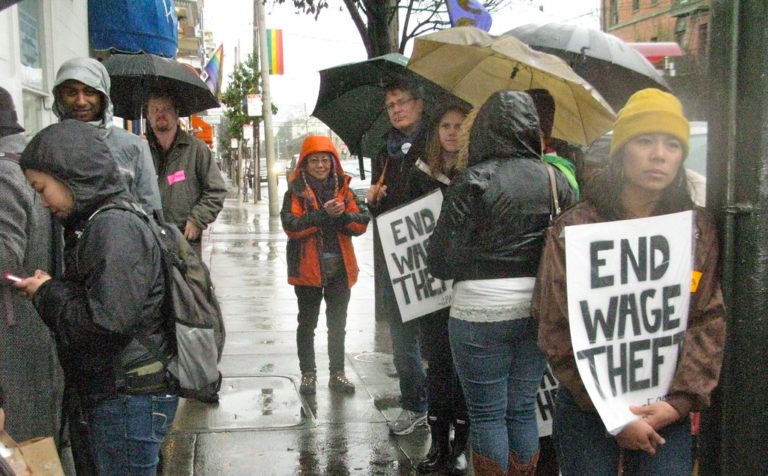OPINION: AMHERST NEEDS TO PROTECT WORKERS FROM WAGE THEFT

Photo: flckr.com

Editor’s Note: This column appeared previously in The Amherst Bulletin.
Amherst needs to pass a wage-theft ordinance. Because what happened in Amherst last year never should have ever happened and should never happen again.
Nine undocumented Honduran workers worked in Amherst 10 hours a day, six days a week for five weeks in a row. Collectively they were owed $50,173 for their labor — but they did not receive one penny in wages.
These were not workers in the agricultural fields of the Valley or in one of the local restaurants where wage theft routinely takes place. These were construction workers hanging drywall at the North Square Apartments, the marquis project in North Amherst built by the socially-conscious Beacon Properties with over $2.5 million in tax breaks provided by the town of Amherst. Despite Beacon’s commitment to building affordable housing, their progressive social values did not guide the way the development was built.
Over the past year, I have been working with the North Atlantic States Regional Council of Carpenters (NASRCC) to study wage theft in residential construction in New England. As part of this project, I have conducted over 45 in-depth interviews, including a dozen with workers and union staff in Amherst. I also reviewed corporate and legal information about the Amherst project. While I have documented how common wage theft has become across the Northeast, nothing compares to what happened in Amherst.
Beacon properties hired Keith Construction as the general contractor, who awarded Combat Drywall the contract to hang the sheet rock. Combat, however, has no employees to perform the work and subcontracted the work to Alvarez drywall. Alvarez is not registered with the Secretary of State in Massachusetts as a business, has no website, no phone number and no real company identity. He has no direct employees, but acts as a labor-broker bringing undocumented workers to the job who work as independent contractors. He would pay them in cash. Week after week, Alvarez promised to pay, but after five weeks of grueling work, several workers reached out to Frank Gomez, an organizer with the Carpenters Union. For a number of years NASRCC has employed organizers like Gomez who work full time assisting nonunion workers facing wage theft. Gomez had helped other workers to get back wages from Combat, who he calls “a repeat offender.”
Beacon’s President Joshua Cohen was aware of this situation, but refused to intervene. On July 28, 2019 Gomez filed a wage complaint with the Massachusetts attorney general’s office on behalf of the Combat workers.
Months went by and these incredibly vulnerable workers had still not received any payment for hanging approximately one half of the drywall at North Square. They borrowed money from family and friends. One worker told me how he had to ask for money back that he had sent to family in Honduras. Other borrowed from loan sharks.
It took 10 months for the Attorney General to act on this case. On April 16, 2020, the office issued citations for violation of Massachusetts labor law to both Combat and Alvarez. The nine Combat workers will potentially receive only $23,977.85 — less than one half of what they were owed for the work they performed.
The civil penalties assessed against the firms were minuscule. A $2,000 penalty for Combat was little more than a slap on the hand, and the $17,500 the AG assessed Alvarez can be more than covered by the money he stole from workers.
The workers in Amherst were fortunate to have the Carpenters Union advocate for them. And even though the attorney general acted on their case, it indicates just how broken the regulatory structure is at the state level. Workers had to wait for 10 months to receive less than 50% of their wages. And in no way do these very small penalties deter employers like Combat and Alvarez, or others like them, from repeating the illegal practices used at North Square.
Under current regulation, Beacon Communities was never held responsible for this illegal and immoral activity. Only in the past few weeks, the Gazette has reported that Beacon’s Cohen indicated that “We are prepared to make up the difference” in workers’ wages.
While the workers will be overjoyed to receive what is rightfully owed them, it shouldn’t take bad publicity to shame a developer to do the right thing. It should be part of the bylaws that govern what happens in our community, which is why we need to support the proposed anti-wage theft ordinance in Amherst. We must ensure that no workers toiling in our community will ever again have to face what the workers at North Square had to experience.
Tom Juravich is Professor of Labor Studies and Sociology at UMass Amherst.

Many thanks to Tom Juravich for this heartrending account of a contractor’s cruelty to truly vulnerable people! It is clear that anything the Town can do to protect workers from wage theft is worth doing. Kudos to the Councilors who are working to get a Town bylaw proscribing this.
As a former prosecutor, though, I wondered: Why no prosecution? Isn’t wage theft a crime, just as if that contractor had snuck into the workers’ homes and stolen the same amount in cash?
If District Attorney Dave Sullivan were prosecuting this contractor for stealing that same amount in cash money, the contractor would be looking at a $25,000 fine, from 2 to 5 years’ imprisonment; or both. See the Massachusetts larceny law, Mass. General Laws, Chapter 266, Section 30, subsections 1 – 2; https://malegislature.gov/Laws/GeneralLaws/PartIV/TitleI/Chapter266/Section30.
This statute lists the kinds of property whose theft a crime in the Commonwealth. It includes deeds, certificates of title, electronic data, and more — but not, in these words, “wage theft.” So – what about getting the Legislature to add “wage theft” to the list?
In 2021, when the new legislative session starts, I imagine that Senator Jo Comerford and Rep. Mindy Domb would be open to introducing legislation to do just that. Actually, recruiting as many co-sponsors as possible before a bill is introduced could ensure that it’s must-pass legislation.
Also, what if the law mandated restitution to victims of the amount stolen, or double that amount, etc.? What if the maximum fine were commensurate with the amount stolen? Those are just ideas. They would however help to level the playing field between employers and workers, and would be more of a deterrent. And legislators are always looking for revenue.
Would the Carpenters’ Union, the AFL-CIO, etc., be willing to recruit House and Senate co-sponsors? Would the Commonwealth’s District Attorneys get behind it, and testify for it at the bill’s legislative hearing? Our Chiefs of Police? What about the Attorney General? Given the slow response of her office here, she might be glad to share with the DAs. Would workers and labor experts testify for the bill? Would Amherst Town Councilors?
A tip from drafting legislation to combat a different form of crime: Have the bill include provisions for notifying the DAs, Chiefs of Police, and associations of building contractors, restauranteurs, etc., of the new criminal provision — including the penalties. Mandate that the AG list “wage theft” as a crime that victims can report on her website portal. If she decides that a case is worth prosecuting, but not by her office, she can and does farm it out to the appropriate DA.
Mandate that workplaces prominently post information on the crime of wage theft, including how to report it, where workers will see it. Best would be to post this in the five languages spoken most commonly in Massachusetts.
Another possibility: Require the AG to report annually to the Legislature on, e.g., number of crimes of wage theft reported, to her office and directly to DAs; total allegedly stolen; number of indictments; number of convictions; amount of restitution to victims; amount recovered in fines.
In other words, simply passing a law is not enough. If it’s to change behavior to any appreciable extent, the law itself must include an enforcement superstructure.
The primary purpose of legislation unambiguously criminalizing wage theft would be to deter it. For criminal law to deter crime, however, potential perpetrators must know (1) what constitutes a crime, and (2) what penalties they face if they perpetrate it.
The front-line police officers and others charged with enforcing it must know about it, as well. Otherwise — true, up to the minute, stories from the crisis of illegal foreclosure, if you wish — the police will refuse to take complaints about the crime, believing that it’s a civil violation only.
We know that the dastardly case reported here is just one of many. It’s a laser on the need to do justice for thousands of vulnerable Commonwealth residents. Legislation, such as that suggested here, should help.